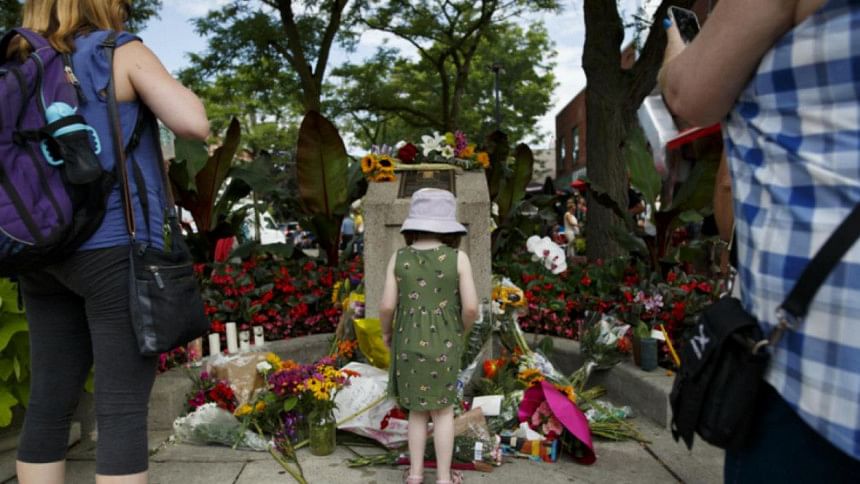Addressing mental health: Lessons from Toronto

Toronto is a city which wholeheartedly accepts inclusivity, diversity and progressive thought as the foundational norms of its everyday journey. This Canadian cosmopolitan city posits a wide array of multicultural settings—from the famous Danforth-Victoria Park region which houses a high number of Bangladeshi immigrants, to the globally acclaimed financial district in Downtown Toronto.
Danforth Avenue is one such location—a bustling and busy part of Toronto, commonly referred to as Greek Town for its array of traditional Greek eateries and shops. In what has been termed a dark day in the history of this city, two people were brutally gunned down on July 22. The perpetrator: a 29-year-old man, described as "unflinchingly polite" and one who had a smile that could "light up a room". Citizens mourn and are bewildered by the increasing number of hostile crimes that have gripped this Canadian metropolitan, and stakeholders are engaging in important discussions as to how they should be addressed.
The shooter is now dead—he was gunned down in an altercation with the police. But not before killing an 18-year-old woman, scheduled to start Nursing School at the prestigious McMaster University, and a 10-year-old child. Thirteen people were injured, and a dark cloud of uncertainty hovers over the country because of this senseless violence. Twenty-nine-year-old Faisal Husain suffered, according to his family, from severe mental health problems—specifically psychosis and depression. Husain was the son of Canadian parents of Pakistani origin—his sister passed away in a car accident, whilst his brother has been hospitalised due to a stroke. And herein lies the problem—we increasingly see a common trend across the aisle where lack of understanding of the mental health issues is causing a seeming rise in the number of unnatural deaths, provocative violence and crimes across the Western world. Whether it be the infamous van attack which rampaged Toronto a couple of months ago, or this shooting incident in Greek Town—the system and its actors need to adapt in order to truly understand and tackle mental health concerns.
From a micro scale, as a student at the University of Toronto, I have seen two distinct pictures when it comes to mental health. For one, families and friends around those suffering from mental illnesses constantly and vocally support them in their attempts to treat various mental health concerns. Canada has an institutional system to tackle mental health, and whilst its success remains an area up for debate, there is little to no doubt that from the perspective of the state, issues ranging from depression to anxiety are legitimate concerns for this society. But from a different angle, the individualistic nature of how society progresses in the West means that people suffering from mental health concerns have to take on the responsibility of addressing their health concerns single-handedly. It is difficult, and the situation may degrade if the treatment is not working—and outbursts might happen. Now there is absolutely nothing which in any way can defend the actions of Faisal Husain, but there is a broader picture to this. Without a concerted effort to address the individual challenges of mental health patients, through a wider network of services, ranging from tangible budgetary resources to personal support from the local community, it is extremely difficult to overcome the challenges which exist in mental health provisions. And this is something that the West, and indeed the global community, needs to understand.
The other side of the story remains in the vicinity of guns. John Tory, who serves as the Mayor of Toronto, said that this city has a gun problem. Access to guns or the usage of guns is an issue to which policymakers and local authorities need to put more immediate attention, but there is an interesting correlation to be ascertained. While it may be too soon to suggest this, the increasing number of gun-related crimes in neighbouring US under the Trump regime is being diffused towards increasing gun-related crimes and stabbings in Canada. It begs the question as to whether a sense of populism or a lack of attention towards health concerns which need to be tackled by the US is having an effect on the public psyche of Canadians. However, it is important to clearly distinguish between acts inspired by radical motives and acts involving deep-seated mental health concerns. As has been suggested earlier, nothing justifies what Faisal Husain did, but if this society wants to prevent such heinous acts in the future, the root of the problem has to be clearly analysed and fixed by policymakers and communities.
This week Canada lost an aspiring nurse and a child to a merciless gun attack. This cannot continue in a society which prides itself on being a safe and united city. It is also important for our families and communities to look deeper and engage with members in our society who suffer from mental illnesses. We have witnessed the ignorance and defiance shown towards mental health patients in our own communities back in Bangladesh, and sometimes we must bear a collective responsibility for being unable to help those around us in need of time, treatment and attention. For so many years have we treated depression and anxiety as miniscule if not irrelevant when it comes to personal health; it is preposterous to continue doing this. Second-generation immigrants and those who have a difficult time adjusting to conflicting cultural norms have a difficult time when it comes to functioning normally in a city like Toronto. And therefore the rise of mental health concerns amongst immigrant families is not surprising either, but we must address them head on. And the only way this will happen is if we recognise that both Western communities and non-Western communities have, in their own way, refrained from prioritising mental health concerns, or have side-lined them to a dark corner in their national stories.
Toronto mourns the loss of its citizens—and the world looks on in shock at the increasing number of incidents related to gun violence. Yet, without identifying and concentrating on the fundamentals of the problem—no prayer, no statement and no thoughts are going to be enough. And, as such, we need to stay firm and strong and explicitly say that addressing mental health problems across the aisle must take a simultaneous front seat in policymaking, homemaking and professional life.
Mir Aftabuddin Ahmed is a student of economics and international relations, University of Toronto.
Email: [email protected]

 For all latest news, follow The Daily Star's Google News channel.
For all latest news, follow The Daily Star's Google News channel. 








Comments